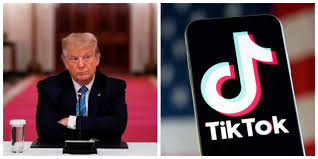Are we close to saying goodbye to TikTok?
On Friday evening, speaking to the press pool, US President Donald Trump said that TikTok would soon be banned in the US, sparking an outpouring of emotional responses from the app’s users, and a major surge in downloads of alternate video apps.
The speculation prompted a response from TikTok, with US General Manager Vanessa Pappas posting this video message:
TikTok additionally issued this official response:
“These are the facts: 100 million Americans come to TikTok for entertainment and connection, especially during the pandemic. We’ve hired nearly 1,000 people to our US team this year alone, and are proud to be hiring another 10,000 employees into great paying jobs across the US. Our $1 billion creator fund supports US creators who are building livelihoods from our platform. TikTok US user data is stored in the US, with strict controls on employee access. TikTok’s biggest investors come from the US. We are committed to protecting our users’ privacy and safety as we continue working to bring joy to families and meaningful careers to those who create on our platform.”
This is in line with TikTok’s more recent push to underline its benefit to the US economy – at a time when jobs are shrinking due to the impacts of COVID-19, TikTok is looking to invest, it’s looking to build while most are doing the opposite. The US Government can’t say no to that, right?
But then again, the proposed ban is not about that – the Trump administration is either concerned about potential spying by the Chinese Government, or it’s looking to enact a form of punishment against China for the COVID-19 outbreak.
Which is the bigger consideration is something of a moot point, as the outcome is largely the same, but it is interesting to note the various elements at play within the wider debate around the app’s future.
There are also a couple of keynotes worth highlighting in TikTok’s statement. First off, as per TikTok itself, the platform currently sees around 100 million active users. That’s a significant amount, but the figure that you more commonly see presented in relation to TikTok is total downloads. TikTok reached 2 billion total downloads earlier this year, but it’s worth pointing out that total downloads and total users are completely different things. Downloads, in some ways, reflect popularity, but 100 million active users are far less than Twitter, Snapchat, Instagram, etc. Even Vine had double that amount at its peak.
TikTok is growing, and it is significant, but the impression many have is that it’s bigger than it is due to the focus on total download stats. This is a relevant note in measuring its cultural impact.
But the most important thing to take away from TikTok’s statement is this:
“TikTok US user data is stored in the US, with strict controls on employee access.”
What TikTok doesn’t, and can’t say: “TikTok user data cannot be accessed by the Chinese Government”.
TikTok can’t say this, because it can be – under China’s cybersecurity laws, the CCP can request internal data from any Chinese-owned company for the benefit of the republic. TikTok can’t escape this, which is why it’s being put under pressure to separate its operations from its Chinese parent company, ByteDance – which, following Trump’s threat to ban it, it is now willing to do. It’s unclear if that will appease the Trump administration enough to allow it to keep running in the US.
As noted, it’s also unclear exactly what the main purpose of Trump’s ban threat is. Earlier this month, Trump said that he was considering banning TikTok as a form of punishment against China for COVID-19.
As per Trump:
“[TikTok is] a big business. Look, what happened with China with this virus, what they’ve done to this country and to the entire world is disgraceful.”
Trump said that banning TikTok was one of “many options” that he was considering to hit back at Beijing over what he perceives as a failure on its part to contain the virus. In which case, it’s not even about the company’s Chinese Government links – though US Secretary of State Mike Pompeo has additionally noted that any move to ban the app would be in order “to deny the Chinese Communist Party access to the private information that belongs to Americans”.
Some have speculated that Trump’s latest threat is actually a bullying tactic – as per Bloomberg News reporter Jennifer Jacobs.
The most likely partner in this respect, according to reports, could be Microsoft, which is weighing an acquisition of the short-form video app. This seems like an odd fit, but it would put TikTok wholly into US ownership, which may also please President Trump as it would essentially be stopping any US-originated revenue from heading back to a Chinese organization.
It depends, then, what the actual motivations for a TikTok ban actually are, and how the White House considers TikTok’s moves to address the concerns.
Will TikTok be banned? No one knows for sure, but certainly, it could happen. And if the US bans it, it’s not hard to imagine other western nations may follow suit.
